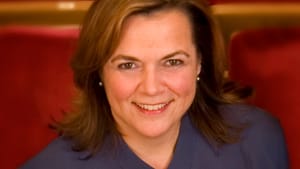Stay in the Loop
BSR publishes on a weekly schedule, with an email newsletter every Wednesday and Thursday morning. There’s no paywall, and subscribing is always free.
CEO's departure leaves the orchestra's wheels spinning
Allison Vulgamore leaves the Philadelphia Orchestra

Allison Vulgamore announced late last month that she will leave her post as the Philadelphia Orchestra’s president and CEO at the expiration of her current contract in December. This leaves further uncertainty for one of the city’s premier cultural institutions. In addition, Vulgamore’s statement gave more than a hint that her departure was not entirely voluntary.
"Fresh voices and fresh Rolodexes"
Like James Comey, she noted that when she took her job in 2010, “I expected to stay aboard about 10 years." She leaves short of that term — and short, too, of the goal for which she was hired: restoring the orchestra to financial stability. The company is about to launch a fundraising campaign to double its endowment, which, at a recently quoted $141 million, remained essentially flat during Vulgamore’s tenure.
Board chairman Richard B. Worley, who will also leave his position next year, mentioned something about having “fresh voices [and] fresh Rolodexes” (does anyone still use those?) at the helm. A translation would seem to be that the orchestra needed new contacts and someone new to make them.
Symphony orchestras across the country have struggled for some time now, but only one major company experienced actual bankruptcy proceedings: Philly’s. If that is not the whole of Vulgamore’s legacy, it is likely to be the one that is remembered best. Given the orchestra’s worldwide eminence, its entrance into bankruptcy was, by a long chalk, one of the most profound cultural embarrassments the city of Philadelphia has suffered.
Orchestra salaries and pensions were cut and have not yet made up ground vis-à-vis major competitors. At the time, many, myself included, feared an exodus of first-chair players and a decline in performance quality that would permanently affect the ensemble. Great orchestras, unlike other institutions, cannot suffer teardowns or traffic in mediocrity. The Philadelphia sound, honed over more than a century, must maintain itself continuously to survive.
A personal plea
At the time, I personally urged Worley to avoid bankruptcy at all costs. It was clearly a course of action he and the board had decided on: a corporate restructuring model. Essentially, this decision was imposed by local elites (including a certain charitable trust that was, at the time, investing tens of millions of dollars in moving a celebrated art foundation from its historic home). I believe from my conversation with him that Worley, a generous orchestra benefactor, was deeply pained by the situation. But I believe, too, that the bankruptcy was a blow from which the orchestra will be long in recovering, and its damage remains ongoing.

It didn’t have to be this way. Another orchestra president, Deborah Borda, just completed a 17-year run as head of the Los Angeles Philharmonic, having given it the — visually and acoustically — best concert hall built in recent years and the largest and best-sourced budget of any orchestra in the country, while quintupling its endowment. Nor, despite its sophisticated market outreach, does the company simply depend on warhorses; it will premiere 23 newly commissioned works next season, an exposure to contemporary music unmet by any major orchestra in recent years. In other words, remarkable things can be done even in the most seemingly unfavorable climate — but only by leadership bold enough to try.
Vulgamore will also be remembered for recruiting and retaining Yannick Nezét-Séguin, whose vigor and enthusiasm and, not least, canny showmanship gave the orchestra’s profile a badly needed lift in a time of crisis. But it now shares him with the New York Metropolitan Opera, an arrangement that must cause concern. Even the most prodigious talent can only stretch so far, and the successor to James Levine, in the spotlight of the world’s cultural capital, will inevitably choose his priorities. Yannick signed on to lead the orchestra into the next decade. But how much of him can Philadelphia realistically expect?
Meantime, the orchestra must find interim executive leadership. That, too, is an awkward situation during a capital campaign. The wheels are turning and, one can only hope, not excessively spinning. The next several years will be critical to the orchestra’s future. It would be nice to be able to recruit someone of Deborah Borda’s caliber to take charge, but she is leaving Los Angeles to take on another troubled project: the New York Philharmonic.
Sign up for our newsletter
All of the week's new articles, all in one place. Sign up for the free weekly BSR newsletters, and don't miss a conversation.
 Robert Zaller
Robert Zaller